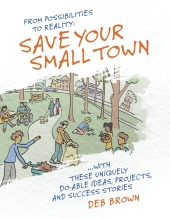posted 9 years ago
Hi Eric!
This is one of the books I am most excited to read. Thank you so much for your work on it. Even the publicity around it I've seen has helped me to begin to advocate for this possibility to people and organizations that have never thought of it.
I wanted to share with you one of the puzzles I was trying to work out with an organization I was affiliated with. I don't expect this to go anywhere, but it was something I tried floating with this organization. I've also been the person trying to plant little hints about permaculture there more broadly, with some success.
The organization is a non-profit mission-based financial institution. They largely serve rural communities, many of which used to depend entirely on mills or factories that have been shut down. What they have going for them, in my mind, (besides their long developed cultural wealth, their gifts as humans, their heritage and history) is a lot of perfectly decent farmland - much of which is still kept in small holdings. There was a great story of a pastor who looked around at one of these monetarily impoverished communities and heard a divine voice reminding him that what they had was land; as a result, he started a beautiful small non-profit that connects kids there with the soil and that lets them earn dignity and wages farming what was left fallow.
The pesky question I keep having is this: the organization I'm talking about does a fair amount of "green lending" - solar panel fields, green renovation, biodiesel, etc.. This area of work has been largely separate from their mission of helping the rural communities they are based in. What I'm really curious about is matching their unique strengths with the possibility of some kind of unique lending product that matches what these poor communities still have (farm land, farms) with what we all need (to not die from climate change). I feel like this is something that happens in international development and financing, but it hasn't come home yet. If farmers who are barely making it could get some kind of support - financial and technical - to transition to "carbon farming" practices, even just in part... this organization is pretty good at mobilizing subsidies, but this is also a much more radical idea than they're used to thinking about.
Can you think of any way in which what I'm thinking about here could come together - a mission-based financial institution with large assets and dedicated service to poor rural communities with decent farmland plus a large amount of more typical green energy lending as well as healthy food systems lending in their portfolio? I don't have that much faith that this specific organization will get the whole picture, see it as right for them (even though it does bridge 3 of their major issues at least), and be able to find subsidies or whatever it would take to make the economics work out well enough to help small farmers who agree to adopt some carbon farming practices - but I'm curious about trying still. I wonder if the funding around mitigating climate change would be enough to make farmers be open to new practices, especially if it would make their failing farm suddenly able to stay within the family, and especially if it reduced their labor. Of course I'm also in my mind taking it to next steps.. .cooperatives, small farm food aggregators, etc. - all of which this organization has lent to in the past individually.
Best of luck on your book!!! Thank you for dreaming big and for this birds' eye view.





